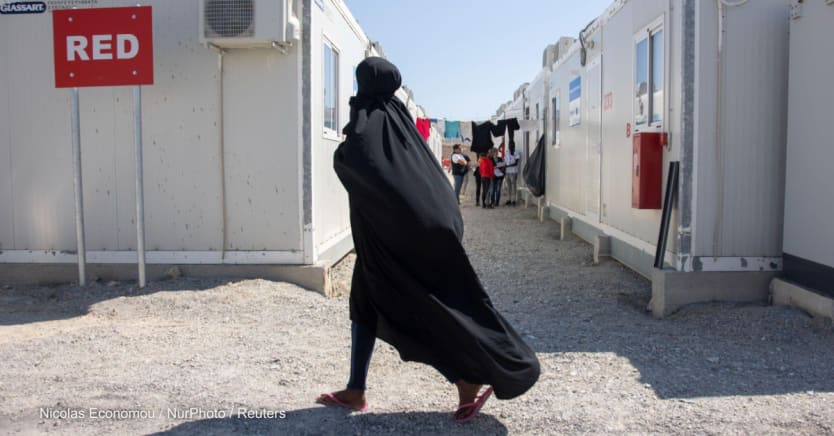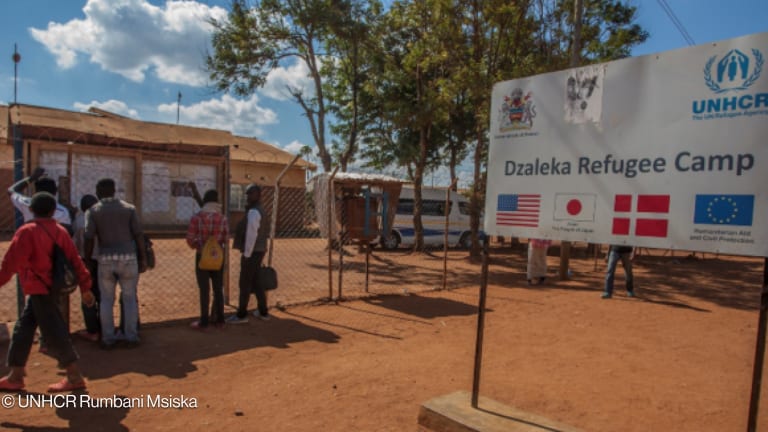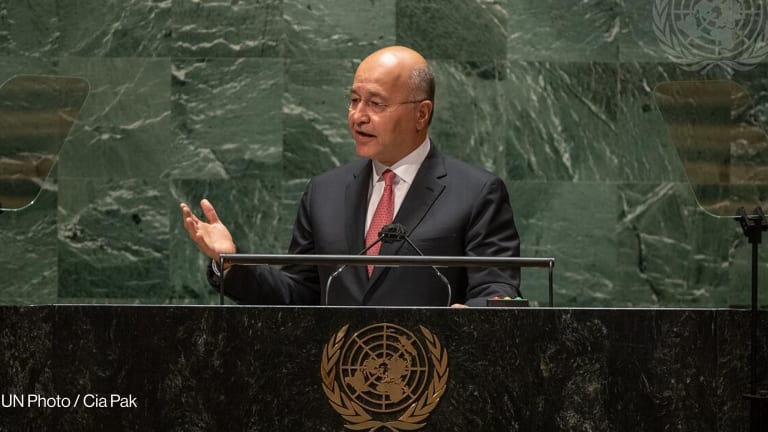
Amid record high global displacement figures, the Global Compact on Refugees, launched in 2018, was meant to provide a mechanism for improving international responses to displacement. At the time, sector professionals criticized the agreement — which was two years in the making but not legally binding — for lacking an implementation plan and clear indicators. Three years later, advocates say progress and follow through on commitments has been slow.
These promises were made, said Nijam Uddin, a Rohingya refugee and general secretary of the British Rohingya Community, but they haven’t been worked on.
The aim of the United Nations-led compact is fourfold: to ease pressure on host countries, enhance refugee self-reliance, expand access to third-country resettlement, and support conditions in refugees’ countries of origin for a safe return.
A year after its formation, the first Global Refugee Forum, hosted in Geneva, attempted to translate the compact into concrete commitments and accountability mechanisms. Governments, U.N. agencies, NGOs, and the private sector made over 1,400 pledges — another 200 plus have since been made — offering everything from employment opportunities and school places for refugees to new government policies, solutions for resettlement, and better support for host communities.
Out of the current 1,626 pledges, according to the U.N. Refugee Agency’s pledge dashboard, only 164 have been marked as completed, 620 are listed as “in progress,” and 47 are considered to be in the planning stages.
“That means we don’t know what’s happened to about 1,000 of those pledges,” said Farida Bena, director of policy and advocacy and head of office at the International Rescue Committee, adding that the voluntary and nonbinding nature of the compact means this isn’t surprising.
“My message to world leaders is please don’t make any false promises. Just do whatever you can do to end the refugee life for the people.
— Nijam Uddin, general secretary, British Rohingya Community“The compact is treated like a menu a la carte where you cherry pick what you like whereas the whole spheric of the global compact was to move forward together as a national community,” she said.
As of the end of 2020, 82.4 million people had been forcibly displaced from their home as a result of conflict, persecution, or human rights violations — an increase of almost 3 million from the previous year.
Described as a “framework for more predictable and equitable responsibility-sharing,” the compact consists of a Comprehensive Refugee Response Framework and a Programme of Action that detail a vision for shared responsibility with an emphasis on supporting host communities and encouraging refugee self-reliance.
“What the compact also set out to do was broaden the base of countries actually engaged in refugee protection and responsibility sharing and that’s really nothing that we have seen,” said Malthe Mulvad, head of advocacy, press, and external relations at the Danish Refugee Council.
UNHCR’s 2021 indicator report on the compact states that 9 out of 10 refugees continue to be hosted in low- and middle-income countries.
The pandemic is partly to blame, said Uddin, who himself lived in a camp for 18 years. In certain instances, Bena explained that pledges had had to pivot to support COVID-19 activities such as vaccination efforts.
“Yes, the pandemic had a huge effect, but it shouldn’t be used as an excuse,” Mulvad said. There are many things that can be done despite of COVID-19, including ensuring development budgets are kept at a certain level and that access to third country solutions aren’t hampered by restrictions, he said.
“More remains to be done,” Shabia Mantoo, spokesperson at UNHCR, said in an email. “Host countries require more support to protect refugee and displaced populations, more third country solutions must be seized — including through resettlement and complementary pathways — and more investment is needed in countries of origin to address root causes of flight,” she said.
Opinion: It's time for a Global Fund for displacement
Donors and governments must do more to address mass displacement.
According to UNHCR, the amount of overseas development assistance dedicated to supporting refugees returning to their countries of origin dropped from $784 million in 2018 to $584 million in 2019.
A report by DRC, IRC, and the Norwegian Refugee Council looking into barriers to compact progress calls into question the amount of political will there is for improving responses to protracted displacement.
“In two out of the three host countries we assessed, the global compact was basically considered but ultimately ignored,” Bena said. “There’s a real question about the political will of the international community to do what it says and follow up on what it agreed.”
During a high-level officials meeting on the compact at the end of last year, the U.N. High Commissioner for Refugees Filippo Grandi called for a redoubling of efforts but said he was “impressed” by the progress that had been made so far.
For example, the number of partners contributing to refugee responses increased almost threefold, and there’s been progress in Colombia where assistance and protection has been increased to Venezuelan refugees and migrants, according to DRC’s report.
During the meeting an additional 50 new pledges and initiatives were announced, including a commitment from Belgium to increase resettlement places and pathways for refugee entry, launch of a statelessness initiative by Eswatini, and signing of a memorandum of understanding between UNHCR and faith-based organization Community of Sant’Egidio to establish a framework for better humanitarian access and strengthened operational responses to refugee crises.
Bena said she hopes this recharges efforts to mobilize the compact. “[My] plea [is] to just match the intentions, to more adequately address protracted displacement with the right tools starting with funding but also political support …There’s no excuse for further delay,” she said.
Set to take place every four years, the next Global Refugee Forum will be held in 2023.
“My message to world leaders is please don’t make any false promises. Just do whatever you can do to end the refugee life for the people,” said Uddin.








